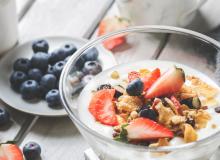Do you often have low fasting blood sugar? In fact, it is not complicated. Refer to this article to find out the reasons and solutions yourself.
Reason 1: Increased glycogen output during fasting
Fasting blood sugar mainly comes from the production of glucose in the liver. Insulin is the only hormone that can inhibit the production of glucose in the liver. If the liver has severe insulin resistance (more common in diabetics with fatty liver), then fasting blood sugar is prone to increase. .
Treatment: Metformin treatment is the first choice. The most important pharmacological effect of metformin is that it can reduce hepatic glucose output, thereby reducing fasting blood sugar and pre-meal blood sugar.
Reason Two: Dawn Phenomenon
Concept: People with diabetes have normal blood sugar at night, but hyperglycemia occurs at dawn (4:00 to 8:00).
Cause: Insulin levels drop in the morning and glucagon levels rise. It is more likely to occur in people with diabetes who have a long course of disease and insufficient medication doses.
During tens of thousands of years of human evolution, in times of food scarcity, in order to prevent hypoglycemia from occurring in the middle of the night and affecting life safety, the body usually secretes more glucose hormones, such as adrenocortical hormones, after 4 a.m. to prevent Blood sugar drops further. A normal human body will secrete sufficient insulin to check and balance the action of glucagon, so fasting blood sugar can be maintained within the normal range. People with diabetes may experience elevated fasting blood sugar due to a lack of insulin secretion to fight glycemic hormones.
Approach:
1. First of all, identify the Hematoxylin reaction: if the blood sugar is elevated in the morning on an empty stomach, measure the blood sugar at 3:00 at night. If the blood sugar is low at 3:00 at night, it is the Hematoxylin reaction. If it is normal or elevated, it is the dawn phenomenon.
2. Choose hypoglycemic drugs that are less likely to cause hypoglycemia and use them in sufficient amounts; for diabetics who use insulin, inject insulin before dinner instead of before bed; it is beneficial to use long-acting basal insulin analogues.
Reason three: Sumujie’s reaction
Concept: People with diabetes develop secondary hyperglycemia in the morning after hypoglycemia at night.
Reasons: Too much insulin and not enough food before going to bed. Seen in patients with diabetes receiving insulin treatment. Less common than the dawn phenomenon, it is the most common cause of early morning hyperglycemia in people with type 1 diabetes.
After people with diabetes experience hypoglycemia at night, the body secretes a large amount of glucagon (glucagon, epinephrine, norepinephrine, adrenocortical hormones, etc.) in order to correct the situation. If the hypoglycemia continues, there is no need to add a meal in time. , excessive secretion of glucagon hormone will mobilize a large amount of glycogen decomposition in the body, which will eventually overcorrect, leading to high blood sugar in the morning.
Approach:
1. Identify with the dawn phenomenon. The method is the same as above.
2. Reduce the dose of insulin before going to bed; add an appropriate meal before going to bed.
Reason 4: Large snacks in the middle of the night
High fasting blood sugar
Some people with diabetes test their blood sugar before going to bed. If the blood sugar shows a downward trend, such as between 5.0 and 7.0mmol/L, they will eat something extra because they are worried about hypoglycemia.
There are also some people with diabetes who do not sleep well at night. They always feel flustered when they wake up and are worried about hypoglycemia. They will also eat many extra meals, resulting in a total extra meal that is too large and fasting blood sugar will rise the next day.
Approach:
If the blood sugar is lower than 5.5mmol/L, it is necessary to eat a snack.
If you have always had the habit of snacking before going to bed, don't change it easily without special reasons, but you can't snack at will or in large quantities.
A portion of the total daily caloric intake from meals should be taken as a snack, generally less than 1/2 or less of the meal. For snacks, you can choose steamed buns, bread, biscuits, etc., and you can add an extra glass of milk.
Dear friends with diabetes, have you found the cause of high fasting? Which one do you belong to? How should I do it? If you don’t know, it’s better to listen to the doctor’s guidance.

